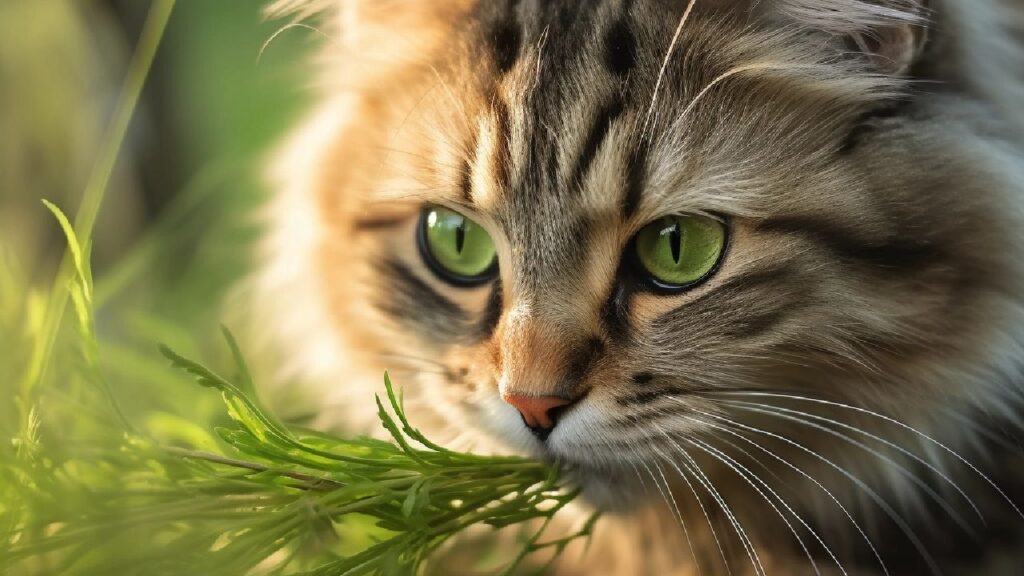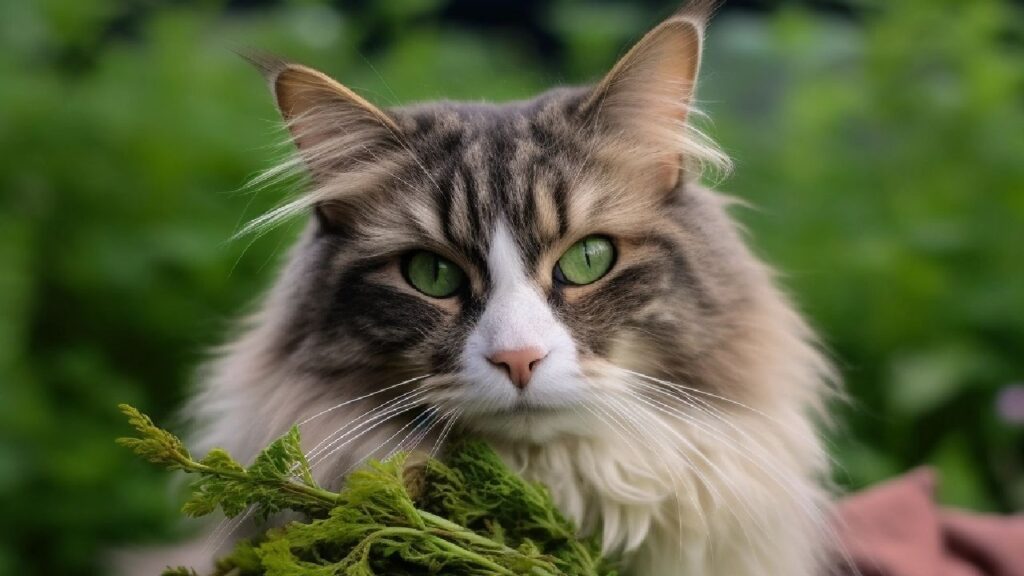When adding flavor and fragrance to our culinary endeavors, few herbs rival the aromatic allure of the rosemary plant. This herb has entered kitchens and gardens worldwide with its distinct pine-like scent and robust flavor.
But as cat owners, it’s natural to wonder whether our feline companions can share this herb’s delight. Can cats eat rosemary, or should we approach it with caution?
Is Rosemary Safe for Cats?
It’s no secret that our feline companions are endlessly curious creatures. Their curiosity leads them to explore every nook and cranny of our lives, from investigating paper bags to perching on high shelves.
When considering sharing our culinary adventures with our cats, we must address their dietary needs and potential sensitivities. While rosemary adds a delightful flavor to our dishes, its consumption by cats prompts the question: Is rosemary safe for feline palates?
Yes, rosemary is generally considered safe for cats in small amounts. However, it’s always a good idea to consult your veterinarian before adding it to your cat’s diet.
The Benefits of Rosemary in a Cat’s Diet
Did you know that rosemary can also offer potential benefits when incorporated into your cat’s diet? Let’s explore some of them:
Antioxidant Properties
Rosemary contains compounds like rosmarinic and carnosic acid, which are believed to possess antioxidant properties. Antioxidants are crucial in neutralizing harmful free radicals in the body, contributing to overall health and well-being. Small amounts of rosemary in your cat’s diet might give them an additional source of antioxidants to support their immune system.
Stress Reduction
The calming aroma of rosemary might also positively impact your cat’s stress levels. Aromatherapy is a known technique for soothing nerves in both humans and animals.
While you shouldn’t expose your cat to essential oils, the subtle scent of fresh rosemary might offer a gentle, calming influence, creating a more relaxed environment.

Enrichment and Mental Stimulation
Incorporating diverse scents and flavors into your cat’s environment can provide mental stimulation and enrichment. The scent of rosemary might engage their senses and offer a novel sensory experience. While it might not be a primary nutritional benefit, its mental engagement can improve your cat’s overall well-being.
Understanding the Risks of Rosemary to Cats
Essential oils derived from rosemary and other herbs are highly concentrated and can pose severe risks to cats, as their livers cannot effectively metabolize these compounds.
The Dangers of Essential Oils
While rosemary is often enjoyed in its natural form in the culinary world, a different aspect of this herb raises concern for cat owners: essential oils. Essential oils derived from rosemary and other herbs are highly concentrated and can have potent effects.
Essential oils pose severe risks for cats, as their livers cannot metabolize these compounds effectively. It’s crucial to differentiate between using rosemary as an herb and exposing cats to essential oils.
Vomiting and Digestive Upsets
The digestive system of a cat is both intricate and sensitive. Cats that consume substances their bodies are not accustomed to, such as certain plants or herbs, can lead to digestive upsets.
Despite its culinary charm, Rosemary can potentially trigger vomiting and gastrointestinal discomfort in some cats. This cautionary tale underscores the importance of understanding the individual reactions of cats to new flavors.
How Much Rosemary is Too Much?
Regarding rosemary for cats, moderation is key to ensuring their well-being. Start with small portions and observe your cat’s response, adjusting as needed to avoid digestive issues and maintain their dietary preferences.
Moderation Matters
As with any dietary addition, moderation is key. While some cats might nibble on rosemary without noticeable effects, others might experience adverse reactions.
To ensure your cat’s safety, it’s advisable to err on the side of caution and avoid offering rosemary in large quantities. Moderation reduces the risk of digestive issues and allows you to introduce new flavors while maintaining your cat’s overall well-being.

Navigating Portion Sizes for Your Cat
Determining the right portion size when offering rosemary to your cat is a balancing act. As we gauge portion sizes for their regular diet, applying the same principle when introducing herbs like rosemary is essential.
Start with a small, carefully measured amount and observe your cat’s response. If there are no adverse effects, you can cautiously incorporate a pinch of rosemary into their meals while always keeping their dietary preferences and sensitivities in mind.
Incorporating Rosemary into Your Cat’s Diet
If you’re inclined to introduce the flavors of rosemary to your cat’s culinary repertoire, there are thoughtful ways to do so. While some commercial cat foods contain traces of herbs like rosemary, you can also create your feline-friendly treats.
Mixing a tiny amount of finely chopped fresh rosemary into your cat’s food can offer a hint of flavor without overwhelming their palate. Remember, it’s about a subtle infusion rather than a full-on feast of this aromatic herb.
Conclusion
Ultimately, whether cats can eat rosemary hinges on various factors, including individual sensitivities, health considerations, and how the herb is introduced.
Every choice you make in your culinary companionship with your cat is a testament to your bond. You create a tapestry of flavors that weaves seamlessly into their world by approaching their diet with care, curiosity, and a sprinkle of rosemary plant-infused wisdom.
FAQs
Can rosemary be used as a natural flea repellent for cats?
Rosemary has been used as a natural flea repellent for dogs but is not recommended for cats. Cats are more sensitive to essential oils, and their concentrated nature poses risks to cat health.
Are there any alternatives to rosemary for enhancing my cat’s diet?
There are various cat-safe herbs that you can consider incorporating into your cat’s diet, such as catnip, parsley, and thyme. These herbs can offer flavor variety and health benefits.
Can rosemary help with a cat’s bad breath?
Rosemary’s pleasant scent might temporarily mask bad breath, but it’s not a solution for underlying dental issues. If your cat has persistent bad breath, consult your vet to address the root cause of the problem.
Can rosemary enhance the smell of a cat’s litter box?
Rosemary’s aroma can be pleasant; however, it’s not advisable to use it to mask litter box odors. Cats are sensitive to strong scents, and introducing unfamiliar scents might discourage litter box use.
Can rosemary help with hairballs in cats?
There’s no scientific evidence that rosemary helps explicitly with hairballs. Regular grooming, proper hydration, and a balanced diet are more effective measures to prevent hairballs.
Can rosemary be given to kittens?
It’s best to avoid introducing rosemary to kittens, as their digestive systems are still developing. Kittens have more delicate systems, and introducing new flavors is not the best idea.






Cats and rosemary—such an unexpected combo. I might have to rethink where I keep my herb garden. Do cats generally avoid strong-smelling herbs?
Going to try this with my cat, who’s always curious about what’s on my plate.
my cat thinks she the queen of herbs.
anyone tried this